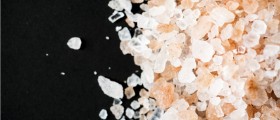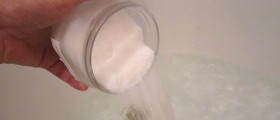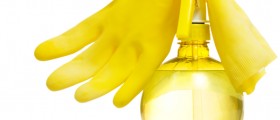Epsom salt is magnesium sulfate, and it got its name after the town of Epsom in England, where it was first distilled from water. These salts are widely available in drugstores or supermarkets and it is fairly inexpensive.
Epsom salt has many uses. Mainly, it is used for soothing baths, but, it is also a very beneficial plant food, especially in organic gardening. It has many health benefits, it improves the appearance of the skin, and it can also be used to treat certain infections.
Health Benefits of Epsom Salts
These salts, whose chemical formula is rather complicated- MgSO4-7H2O, have been used for a long time to treat many ailments, like sprains, back pain, and similar problems. If used on cuts, burns, and bruises, they speed up the healing process and prevent complications. They provide relief from colds, flu, congestion, sinus problems, and similar. They regulate enzymes in the body and contribute to detoxification.

However, even though their use is wide and very popular, science seems to have ignored Epsom salts for a long time, and not many studies have been performed to back what the experience of so many people has already proven.
- An integrated review format was chosen for present article and many medical and scientific literature on magnesium and its essential role in health and interaction/s with vitamin D were reviewed.
- Results indicated that chronic magnesium deficiency is common among the general population as well as in the hospitalized patients. It may induce a wide range of clinical complications.
- Investigations have indicated that the activities of three major vitamin D converting enzymes and vitamin D binding proteins are magnesium dependent. Furthermore, magnesium deficiency leads to reduced 1,25(OH)2 vitamin D and impaired parathyroid response.
- In general, the effectiveness of vitamin D is significantly reduced when magnesium homeostasis in the body is not maintained.
Epsom Salts for Infection
Epsom salts have been used traditionally to prevent, reduce and treat various infections. The principle is always the same, and it involves soaking the affected area in Epsom salt water solution for a certain period. In most cases, soaking needs to be repeated several times to be fully effective.
A person who has a cut, bruise, scrape, or burn can use Epsom salts to accelerate healing and prevent infections. These salts seem to have an effect on bacteria and fungi, and skin infections caused by those agents can be treated with soaking. Also, infected teeth can be treated by gargling the Epsom salt solution. Even though there is no scientific proof that this will cure the infection, it certainly seems to relieve the pain and reduce swelling. The same goes for swelling and pain caused by an ingrown nail.
Athlete’s foot, tinea versicolor, yeast infections, and nail fungus can be treated with Epsom salts too, although in severe cases this treatment will certainly not suffice.
The important thing about these salts is that they, or their solution, should never be ingested. They are meant for external use only, for soaking, rubbing, baths, or gargling.

















Your thoughts on this
Loading...